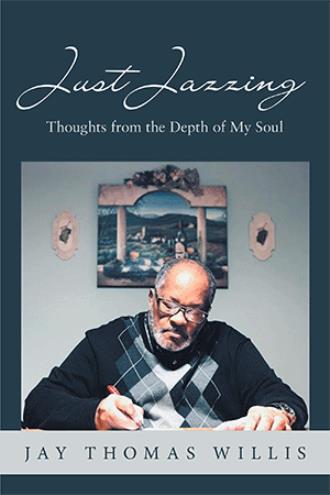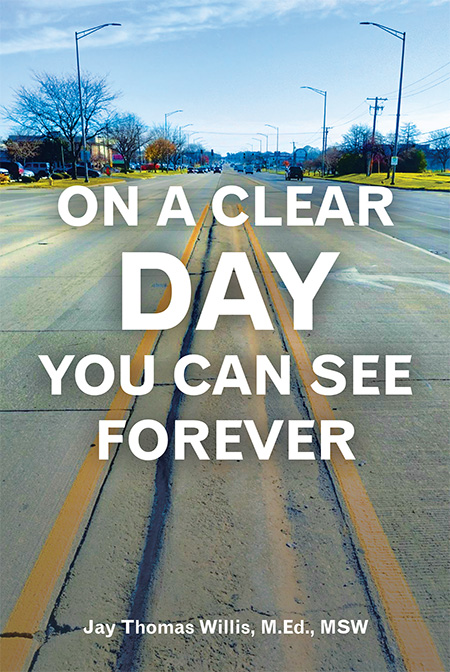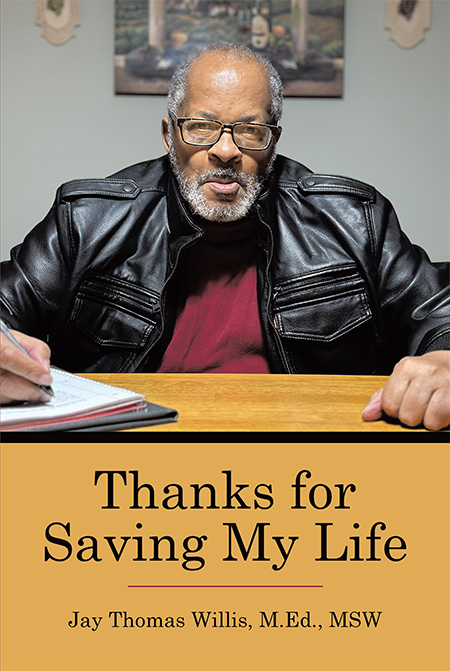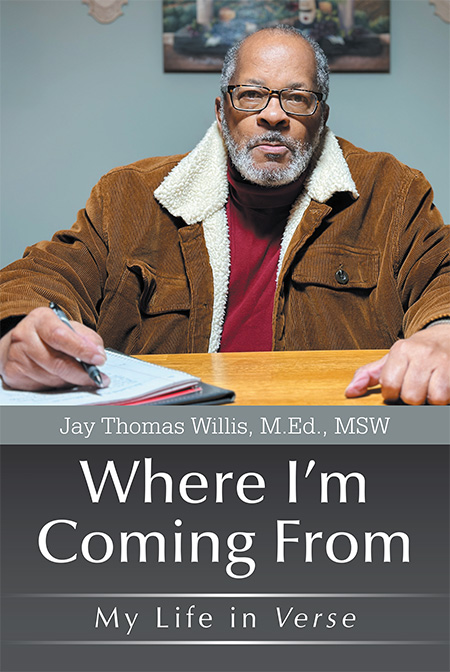
BOOK OVERVIEW
Jimmy and Jason grew up in a rural area of East Texas. They had no electricity until they started school; and didn’t get gas, telephone, or plumbing until much later in life. They were undereducated in the rural school they attended. They also both had schizophrenia as a genetic factor in their background.
This novel follows the two boys through childhood to adulthood. They both had a similar experience but met a different end. Jason and Jimmy both became moderately successful. This novel suggests that you can make your own plans, or people can make plans for you, but these plans will never override God’s plans.
Other Books By Author
Messed-Up Kid — Bits and Pieces of My Life

I remember the year 1964. My friend and I had just sat down in our American History class. It was the second period of the day. I was a junior in high school. The saying, “get it together,” had only recently been popularized. It was a cool fall day in September in East Texas, not long after summer vacation. There were approximately thirty-five students in the class. The teacher was late, so my friend and I started talking. I did something awkward, and my friend said, “get it together.”
I took this as an indication that I had a fundamental weakness in my presentation that needed to be adjusted, being as self-conscious as I was. I was conscious of the fact that I sometimes was short of the mark. This individual was outspoken and was thus trying to say what needed to be said. I had some weak points. By telling someone to get it together, was designed to make you self-conscious. I also new my friend saw it as an opportunity to mumble a popularized phrase that he had learned over the summer. But probably knew that I felt inadequate and was inadequate in some ways.
Many students had brought back from Dallas, where they spent their summer vacation, many new terms and concepts—”get it together” was only one of these concepts.
I didn’t realize that “getting it together,” was much like Maslow’s process of self-actualization. The process was rarely achieved, because by the time one achieves it, the very definition of what you were trying to achieve would have changed. In other words, it is a process rather than an achievable state of being.
Since that time, I have constantly worked on, “getting it together,” but this state of being is allusive. This leads me to believe I will never have it all together until I die. As a matter of fact, whether you have it together depends on how you feel about yourself. Many people don’t feel they have it together and some of them don’t.
I entitled this book of sayings, “Messed-Up Kid,” because this process of “getting it together” has been a life-long process for me. And none of us will ever likely get it all together.
These sayings were collected from various sources. I couldn’t account for these sources if my life depended on it. Many of these sayings are my originals. I have simply memorized most of them. I have collected these sayings because for me they represent the process of “getting it together.” Some of these sayings helped me to be further along in the total process of “getting it together.”
I was raised on an isolated-rural farm with the rest of the animals. I was under-socialized. I had to develop my own understanding. So, “getting it together” socially and psychologically has been one exasperating process.
This book of sayings, “Messed-Up Kid” is all about working on the process, before one passes away, and not necessarily ever achieving it.
God Told Me To Tell You

The author took the title for this book from many ministers and church people. They both frequently will say something, and then say, “God Told Me to Tell You . . .” The author knows God hasn’t told him to tell anybody anything (at least not directly), but God put these sayings on his heart. When people say, “God Told me to Tell You . . .,” the author believes it is understood that they are trying to tell you what they feel is for your own good, not necessarily from the mouth or voice of the Almighty God. No one we know of has ever heard a word from the voice of the Almighty God. If they did hear a voice, it didn’t come from God, but from their inner voice. The saying, “Over the Celestial Wireless,” meaning, the words came from a direct line to the Almighty God. Though, God didn’t actually tell them to say the words. These sayings came from the author’s cerebral consciousness. He simply sat in his easy chair and forced his brain to conceive these sayings. The sayings were forced, but they were a labor of love, and not a great deal of hard work. Most of these sayings came straight from the author’s own conceptions. This collection is more so his than any of his previous books of sayings.
The sayings mostly deal with his life experiences. He has come from a mighty long ways: from a farm in East Texas (plowing a mule from sunup to sunset, cutting wood, fixes fences, shepherding animals—with only a trail to his house until he was six years of age, rats running through the walls, rain coming through the roof, wind coming through the cracks in the walls, hot in summer and cold in winter); to college in East Texas (where he was out of place); to Houston; to the military; and then to a South Suburb of Chicago (where he experienced cultural shock). These sayings detail his benefit from these experiences. He has been in a South Suburb of Chicago for the past forty-six years. He finally made a fairly harmonious adjustment to his environment by having better living conditions.
There have been some good, bad, and ugly times; and he is seventy-three-years old, has a few medical problems, but still alive and kicking. You will find his sayings interesting—to say the least.
The author has tried his level best to not include sayings from other of his books of sayings, and he has also tried not to repeat the same sayings in this book; although, a few of them may have similar meaning. None of these sayings were deliberately taken from other sources.
Some will say these sayings are nothing exceptional, but they came to the author for a reason, and he simply wrote what came to him. Anytime a higher power had a hand in something it is for a reason. The author hopes the reader can enjoy these sayings and put them to good use. The author feels that he is not capable of producing such sayings without the help of the Almighty God. All these sayings are just some thoughts that came to his consciousness over a period of several months. When a thought came to the author, he had to immediately write it down or else would forget to do so. He lost a lot of thoughts by not immediately writing them down, saying he would write them down later. That’s what happens when you are seventy-three-years old.
Some of these statements are sayings, some are general advice, and some are simply personal thoughts. I am proud that these sayings are completely my own. I did rely on my memory to tell me which sayings I had used before, and my memory does leave something to be desired. These sayings are from the author’s perspective and are the truth. Some of these thoughts are rather mundane, while others are more profound. Most of what the author says is well known, and only serves as a reminder of how we need to live our lives. Some of the categories in this book are rather fluid, and sayings could fit as well in one category as another. The author made an arbitrary decision and placed them in one of the categories.
He has written several other books on the plight of African Americans, and several books of sayings. They all can be found @ amazon.com by Jay Thomas Willis.
Jay Thomas Willis
Richton Park, Illinois
Just Jazzing — Thoughts from the Depth of My Soul

This book is composed of sayings, thoughts, statements, and ideas mostly from the author’s own unique perspective. This is wisdom he has accumulated over his life. He didn’t simply copy something he had read or heard but combed his own mind deeply to come up with them. He wrote what the Almighty God put on his mind. If it seems that you have heard them before, it’s only because he must have had similar thoughts as someone else. He wrote these sayings sitting in his library/study while contemplating, some while at the local library, some while driving along the highway, others while on daily walks. While at home, he usually wrote while listening to smooth jazz on his radio or TV and sitting in his comfortable Lay-Z-Boy with a warm blanket—especially during the winter and spring months of 2021 and 2022.
The author could almost perceive a saying in any situation that he thought of. Important lessons are in everything we do if you look for them. Some will say these ideas go without saying, but the Almighty forced them into his consciousness for a reason.
Some of them may not seem powerful, but they are what came to him as he sat in his chair, held his pen, and engaged in freewriting. The author is seventy-four-years old, and these ideas have evolved into his approach to life. He admits that a few of these ideas are not quite completely his own. He gives credit where it is due. Some of these ideas were adapted from radio, TV, Internet, and restructured for his own taste. In only a few cases, if any, did he take direct words from others. He put this book of ideas, statements, thoughts, and sayings together one at a time.
Over the years he recorded some of these ideas in his subconscious mind, and finally reached back for them. They came from family, his years of education, and people he met along the way. Most of them are new creations from his own cerebral consciousness.
In pursuing his college and university education, he is sure he got a good bang for his buck. There are lots of regrets in his life, having pursued a higher level of education is not one of them.
Forgive him if he used a few of these sayings from other of his books, sayings from any other books or sources, or some of the more common sayings that we hear every day. He made every effort not to do so. He may not have met his objective in all situations in this regard, in some cases it is difficult for him to remember if he used an idea before. He had nothing but his memory to rely on, and his memory is not all that reliable. He didn’t take the time to go back and read all his books and compare ideas.
He believes most of these statements are true to life. The author would never make a statement that he didn’t believe was true. He does agree with all the statements and ideas he has made, even though some of them are restructured and revised. After seventy-four years of soul searching, these ideas thoughts, sayings, and statements come from the depth of the author’s soul.
These ideas usually came to his mind rather rapidly but faded like snow in a hot frying pan. Some of them he was able to recall, but many of them were lost forever. He didn’t always have a pen or paper handy. His short-term memory is not as good as it used to be.
He writes from the perspective of his experiences from the time he was a child on a dirt farm in East Texas, to college, to the Navy, back to graduate school in Houston, and on to his many years in Chicago. He had a multi-problem family: alcohol, mental illness, physical and mental abuse, philandering, etc. There was no electricity for many years, no gas, no telephone, and no running water. For years they didn’t even have a well. They didn’t get these things until later in life. They had no transportation for many years, and his father worked on the Gulf Coast, and came home twice a month. He had to walk a muddy-three-mile road to catch the bus to school during his first several years of school. His family gave him no preparation for school.
Life hasn’t always been easy, but he has survived and thrived. It was rough plowing a mule from sunup to sunset in East Texas, being isolated in a rural area; getting an inadequate elementary, junior high, and high school education; and going to college where he was out of place. But he didn’t let any of these things deter him. He kept moving and grooving though he was against the odds. He stumbled, fumbled, bumbled, and mumbled his way through school. He still doesn’t understand how he made it himself, but he considers himself fortunate. He knows he probably only made it with the help of the Almighty God. God sometimes perform miracles through other people. He feels that God put him in this situation for a reason. In the end his situation was for the purpose of promoting his growth and development. These sayings came from his many life experiences.
Of all the sayings he wrote, some he felt were not appropriate for the book—those he discarded. Some of the categories denoted by the chapters are artificial. A few of the sayings could have just as easily fit in another of the categories. He had to decide on one or the other. Check out this and other of his books @ www.willisjay.com.
Going with the Flow — Some Public and Private Thoughts

I worked at a mental health center many years ago. One day one of my fellow workers made the comment: “When times get tough you’ve to fight, flee, or flow.” The fellow worker prided himself in being able to repeat these kinds of sayings. Since that time, I have come to realize that these are only some of your possible options. I don’t know why the fellow worker said this, or where he appropriated the idea. I am sure the fellow worker must have heard the statement over and over during his lifetime. The worker was an older Mexican gentleman. Since that time, I have thought about the statement many times. I figured that maybe the gentlemen thought and saw how dissatisfied I was with my situation at the center.
When considering a title for this book of sayings, I quickly latched on to the title, “Going with the Flow.” I liked this title because I am not one to flight or flee. And “Going with the Flow” is more a part of my natural style. I am now a retired social worker, who was a private counselor for several years, and has always tried to encourage people to “Go with the Flow.” In some cases, it is the best way to operate, especially when there are seemingly few alternatives.
The statement describes my feelings about life in general up to this point in my existence. I haven’t always gone with the flow, but have moved closer to this mode of operating.
Most of these sayings came from either my background and experiences or my cerebral, creative consciousness. Most of them came from my creative consciousness. A few of them are common sayings that I have memorized from hearing over and over throughout my lifetime. None of them were deliberately taken from other sources. Most of them are products of my life experiences. As I get older, I find that my environment while growing up was richer than I thought at one time, and it did in fact provide me with many of these sayings.
These sayings deal with the many vicissitudes of life. I deal with a variety of subjects. Nothing is specifically mentioned about being an African American, but these sayings without a doubt come partially out of the African American experience.
Without a doubt you will find these sayings interesting. They are equally as captivating as some of my other books of sayings. These sayings are simple but powerful, to the point, and down to earth. You will find them extraordinary.
I have composed these sayings while sitting in my study listening to smooth jazz on my TV, during the cold winter season of 2019-20. The book is entitled, “Going with the Flow,” because of the way in which it was written.
You will notice after reading any of my books of sayings that the sayings tend to naturally fall into certain categories. These categories are not fixed in stone. Some of the sayings are fluid and could possibly fall into several of the categories. I had to finally decide on one category.
I have written several other books of sayings. All of them can be found @ amazon.com, or www.willisjay.com.
How I Became Dysfunctional
Notes from a Personal Perspective

How I Became Dysfunctional: Notes from a Personal Perspective is a book of essays about Jay Thomas Willis’ family dysfunctions. It outlines the experiences of the author’s family and many other Black families in this country. It pinpoints the Post-Traumatic Slave Syndrome as being responsible for most of the dysfunctions in the Black family. He gives details about his family’s dysfunction from his own unique perspective. He takes us on a brief-wild ride where you must buckle your seatbelt if you are to come out of this ride in one piece. It is an interesting, mesmerizing, stimulating, and thought-provoking piece of work. His perspective is as close to the truth as you will ever get.
ISBN 13 (SOFT): 9798369405192
ISBN 13 (HARD): 9798369405185
ISBN 13 (eBook): 9798369405208
I Got My Reparations
You Can Get Yours Too

“I Got My Reparations: You Can Get Yours Too,” is a nonfiction book about how the author got his reparations. It details how his family was poor and had a slave and sharecropper’s mentality. They were also plagued with mental illness and other problems. He attended a school that existed on a shoestring budget. He graduated by the skin of his teeth. He graduated college with a B average, went to the military, graduate school, and settled in a South Suburb of Chicago. He lives in a nice house, has two decent cars, and sent his two sons to college—both are doing well for themselves. The author details how he was able to make it by utilizing various governmental programs. He suggests that if you work hard enough, you can get yours just as he did.
ISBN 13 (SOFT): 9798369419298
ISBN 13 (HARD): 9798369419311
ISBN 13 (eBook): 9798369419304
On a Clear Day You Can See Forever Undo

“On a Clear Day You Can See Forever,” is a book of sayings, thoughts, ideas, statements, and affirmations about some of the truths the author has come to realize. He developed these truths from his experiences while growing up on a farm in East Texas, going to college, then to the Navy, back to graduate school in Houston, and then settling in a South Suburb of Chicago. The author expresses how life has impacted him. It hasn’t always been easy, but then life is not always easy for anyone. Life for him was like a pendulum: up and down. But he is happy just to be alive, and to be able to express himself through his writings, which is the only way he knows how. Uncloud your mind and you can see forever. This book will help you to uncloud your mind.
ISBN 13 (SOFT): 9798369419267
ISBN 13 (HARD): 9798369419281
ISBN 13 (eBook): 9798369419274
Thanks for Saving My Life

Thanks for Saving My Life is a tribute to all the people who were responsible for literally and figuratively saving the author’s life. The author has written fifteen brief essays for the purpose of elaborating on this issue. Some of the individuals, organizations, and scenarios saved his life by what they did; others saved it by what they didn’t do. Some were aware they were helping him while others were not. Whether they did it by omission or commission, literally or figuratively, they all made a worthwhile contribution toward saving his life. He describes individuals, organizations, and scenarios from all aspects of his life.
ISBN 13 (SOFT): 9798369425305
ISBN 13 (HARD): 9798369425312
ISBN 13 (eBook): 9798369425299
Where I’m Coming From

Where I’m Coming From: My Life in Verse is a book of forty-six poems that is a kind of memoir written in poems. The author covers the beginning of his life in East Texas, going to college, to the Navy, back to graduate school, and finally settling in a South Suburb of Chicago. The author came from humble beginnings, but was able to attend college, and have a wonderful family. He describes all these scenarios in his poems. It has not always been easy, but then life is not easy for anyone. There are always ups and downs in life.
ISBN 13 (SOFT): 9798369425282
ISBN 13 (HARD): 9798369425275
ISBN 13 (eBook): 9798369425794
Rough Around the Edges

Rough Around the Edges is a book of captivating fictional short stories about some aspect of the author’s past. The author has written twenty interesting and exciting short stories. The stories describe some of his experiences as he grew up and as an adult. The stories reflect some of the author’s past, but in no way are a depiction of reality, and are simply designed to entertain. The author has taken material from his thoughts, dreams, wishes, fantasies, and nightmares. They will excite and delight you. There is no central theme in this collection of stories: each story is meant to be read within itself. If you are interested in a young African American male’s storms, trials, and tribulations in trying to get from point “A” to point “B,” you will enjoy these stories.
ISBN 13 (SOFT): 9798369439944
ISBN 13 (HARD): 9798369439951
ISBN 13 (eBook): 9798369439937
Never Underestimate the Baby Boy

Never Underestimate the Baby Boy is a collection of essays about being the baby boy of a siblingship of ten children. It tells how the author survived and thrived and was able to make it despite his circumstances. He at sometimes lived at the end of a muddy trail with only a horse and wagon for transportation. He concludes that it wasn’t his birth order that hindered or advanced him, but it was certain factors that came together to help him to survive.
ISBN 13 (SOFT): 9798369439975
ISBN 13 (HARD): 9798369439982
ISBN 13 (eBook): 9798369439968
360 Degrees of life in America

Three-Hundred-Sixty Degrees of Life in America is a book of sayings, statements, ideas, thoughts, maxims, and affirmations. It describes the author’s experiences as he navigates from a beginning in rural East Texas town, to college, to the military (in the military he spent time in Orlando, Florida; Great Lakes, Illinois; and Chelsea, Massachusetts), back to Houston, Texas to graduate school, and finally settling in a South Suburb of Chicago. He talks about the things he has learned in his travels and experiences. America is not simply acute or one dimensional but exist in 360 degrees.
ISBN 13 (SOFT): 9798369440001
ISBN 13 (HARD): 9798369440018
ISBN 13 (eBook): 9798369439999
Personal Perspectives on Counseling and Psychotherapy with African Americans

Personal Perspectives on Counseling and Psychotherapy with African Americans is a book of eleven papers that deal with counseling and psychotherapy with African Americans. The author worked for many years in the field of counseling and psychotherapy, which has enabled him to write these papers. Several of the papers were written with a colleague, but most of them were written solely by the author. The author hopes that this book will be his contribution and legacy to the field of counseling and psychotherapy. He wrote these papers several years ago, but only recently decided to convert them into a book, at the time he wasn’t into writing books, and dreaded the process of turning the papers into a book. Finally in 2024, he decided he had waited long enough, and that practitioners could benefit by reading what he had to say about counseling and psychotherapy. The reader will find these papers revealing and interesting. This is all an author could wish or hope for.
ISBN 13 (SOFT): 9798369439548
ISBN 13 (HARD): 9798369439555
ISBN 13 (eBook): 9798369439531